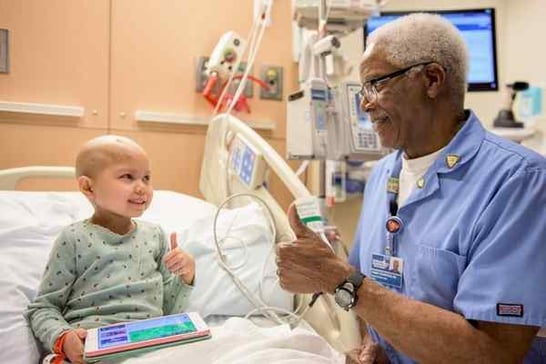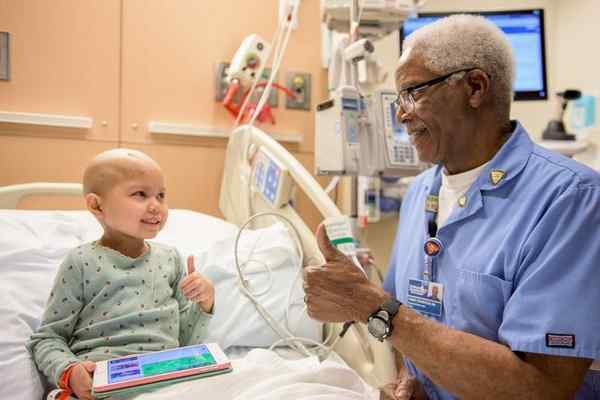 Nurse Tommy will be missed by many of his co-workers, patients and their families. After 50 years of doing a job he loves, Tommy is retiring with mixed feelings. He’s loved working as a hematology-oncology nurse at Children’s Hospital Los Angeles.
Nurse Tommy will be missed by many of his co-workers, patients and their families. After 50 years of doing a job he loves, Tommy is retiring with mixed feelings. He’s loved working as a hematology-oncology nurse at Children’s Hospital Los Angeles.“Love is the reason I do what I do, even though at times it’s painful when you have a loss.” — Tommy Covington, hematology-oncology nurse at Children’s Hospital Los Angeles.
Thank you, Tommy, for the last 50 remarkable years you’ve given us.
From Vietnam and all those severely wounded soldiers and Marines you cared for during your four years as an Army nurse. How many beds did you say were filled in your hospital ward in Guam during one stretch of heavy fighting — 92?
You knew it was just a matter of days, even hours, before you’d be sitting by the bedside of many of these men as they were given their last rites. You felt the pain and the loss, but where was the love?
You came home and enrolled in the RN program at Los Angeles Trade Tech College, leaving your friends wondering why you would want to work in a “female profession.”
You didn’t see it that way. You had just left a war full of male nurses. Gender had nothing to do with saving lives. You landed a job in the hematology-oncology unit at Children’s Hospital Los Angeles in 1970 where your patients now were babies and kids fighting another enemy — cancer.
That’s where you say you found it. In pediatrics. The love.
You cared for these kids and cradled them in your arms for 46 years, giving their emotionally drained parents a chance to catch a few hours of precious sleep. You’d sit at your nurse’s station at 3 a.m. on the night shift and turn on soft music to calm the babies down.
“You cuddle them and make eye contact, and when they smile back at you, well, it’s just a wonderful thing,” you told me. Yeah, I bet it is, Tommy.
But with the love, came the pain. Always. You knew many of these babies and young children would not see another birthday. You had to block that out and just do your job.
“Many of my patients have succumbed to their disease,” you say. “How do you learn to deal with it? It’s part of life. It’s been my way of life for 50 years.”
The people at CHLA tell me you’re a legend at the hospital, one of its most beloved employees. You’re still getting mail and phone calls from parents who can’t shake you from their minds, even years after their babies have died.
If it hadn’t been for you, the heartache they went through would have been so much worse. You helped get them through the lowest point in their lives, and they still feel a need to thank you for that all these years later.
One young mother of a 22-month-old daughter, Jessica, who spent a month in the oncology unit recently, described your gift perfectly.
“It was about 10 o’clock at night and she just kept crying,” Brittany Thornton says. “Tommy came to the door and asked if he could help. He picked Jessica up and it was like magic — she stopped crying immediately and laid on his shoulder.
“He took her for about two hours and let me sleep. He’s the only one who can make Jessica stop what she’s doing and smile.” What a gift you have, Tommy.
And now, it’s time to say goodbye to this hospital you’ve served for almost half a century and go fishing. To throw your line in the water and find that peace you can’t find anywhere else.
Your 71-year-old knees are killing you, and there’s a lot of walking on this job. You don’t want to cheat your patients.
“If I can’t function at 100 percent for them, it’s time for me to go,” you say. I can see that. The smart ones always know when it’s time.
But there’s a hurt in your voice you can’t hide, Tommy. It’s not going to be easy walking away from a job you love, even with all the pain and loss attached to it. You’re going to miss these kids and the rookie nurses you’ve helped train to one day take your place.
They were a large part of why you worked the 7 p.m.- to -7 a.m. shift three nights a week all these years. You joked the hours made the commute from your home in Valencia to L.A. easier with less traffic, but that wasn’t the real reason.
The night shift gave you more independence, a chance to spend extra time looking into the eyes of the crying babies in your arms. Feeling their love.
This morning you’re going into work one last time to clean out your locker and sign some retirement papers before driving home to your wife, Laurie, who also works at CHLA as a staffing coordinator, as does your son, Joe.
Next week, you’ll be on a fishing boat out of Ventura Harbor, throwing your line in the water and just relaxing. It all sounds perfect, but you admit your heart won’t be out there on that boat with you. Not for a while.
It’ll still be at work with all those beautiful babies and children who gave you so much love and pain throughout your remarkable career.
Thank you, Tommy Covington, for the last 50 years. You’re a hell of a man.






